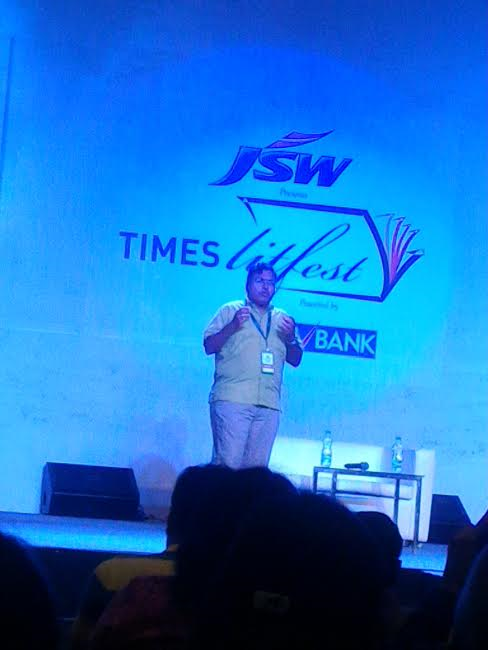The Times Lit Fest was organized between December 2nd and 4th in the Mehboob Studios which has become synonymous with this festival. The theme of this was - THAT MAN WOMAN THING. The theme explores the relationships, or lack of it, across time, place, space, profession, family and literature.
I had the opportunity of attending a talk on 'Devis and Demons' by Mythologist Devdutt Pattanaik, Ramayana scholar Arshia Sattar and graphic novelist Amruta Patil recreating an epic gender battle.
This was mainly about the role of women in mythology- drawing parallels between the two epics or rather similarities. The word Devi reminds us of women and a certain vulnerability attached to them. But both Ramayana and Mahabharata are about women who were strong and also driven by ambition. Kaikeyi was driven by the ambition to see her son as the King of Ayodhya and in Mahabharata we see Satyavati with similar ambition. It is this ambition, which sets the stage for the bigger events to happen.
This was mainly about the role of women in mythology- drawing parallels between the two epics or rather similarities. The word Devi reminds us of women and a certain vulnerability attached to them. But both Ramayana and Mahabharata are about women who were strong and also driven by ambition. Kaikeyi was driven by the ambition to see her son as the King of Ayodhya and in Mahabharata we see Satyavati with similar ambition. It is this ambition, which sets the stage for the bigger events to happen.
 |
| Noted author Devdutt Pattanaik in action |
The men in turn were weak in comparison...they were bound by their word/promise given to their women which caused much heartbreak. And more often we come across Kings who were impotent in both these epics. Both the epics in fact mirror each other in many ways. Mahabharata was a more gory one, where as Ramayana was refined to a certain extent.
Draupadi's vastra haran was done in front of a packed court in front of all the elders of the clan. And when Rama meets Sita after killing Ravana - he tells her that he cannot accept her as he is bound by the rules. She is free to go with anyone she wants be it Lakshmana, Bharata, Nakul , Sahadev or even Vibhishana.....This is a subtle form of disrobing Sita...disrobing of her dignity and all the chastity she stood for.
The experts talked about symbolism too. They also said that acceptance of queers or third gender was natural and common, and so was the sexual act. More often we see that women were impregnated either by Rishis or Devas. It was a common and acceptable practice, so was polygamy and polyandry.
They also cautioned public in general about how these days people tend to pick out a couplet or a shloka from these epics and make it controversial and out of context. They said that to understand anything in these epics, we have to read the book because everything is interconnected and there are stories within stories.
By the end of the session, we felt enlightened and were thirsty for more, as they made is so simple for us to grasp.








.jpg)






1 Comments
I am enlightened too. Well written Janaki.
ReplyDelete